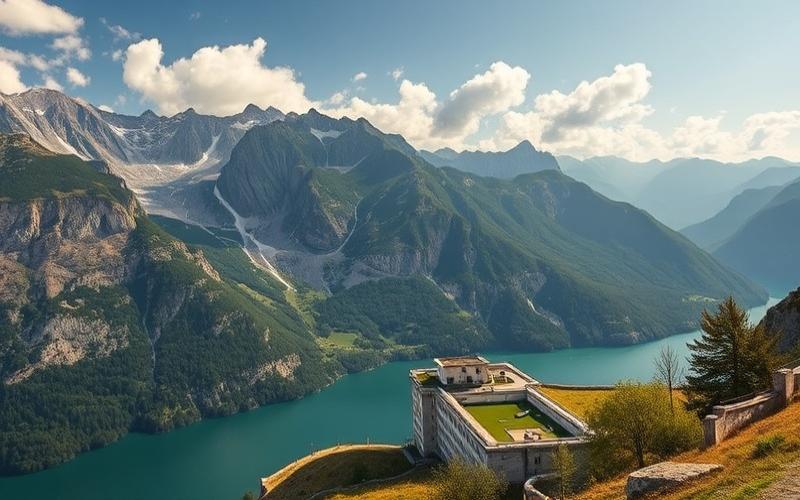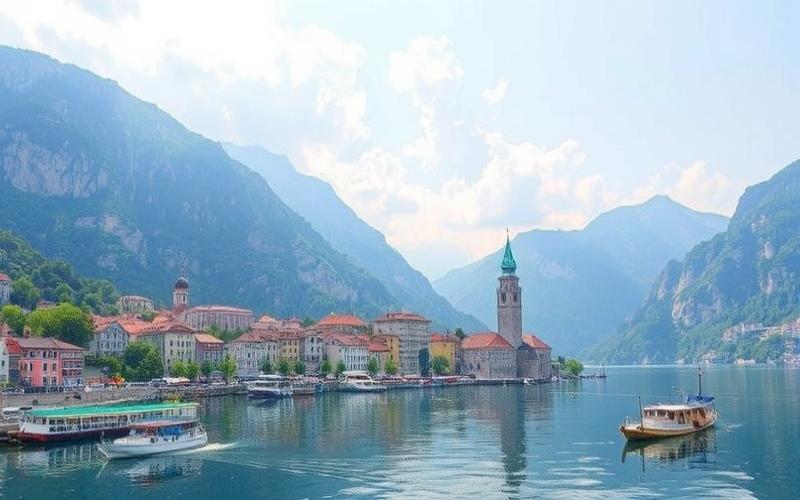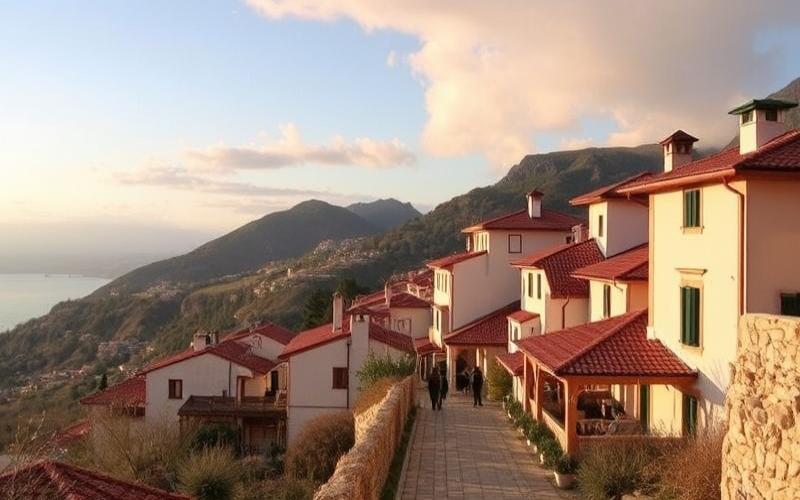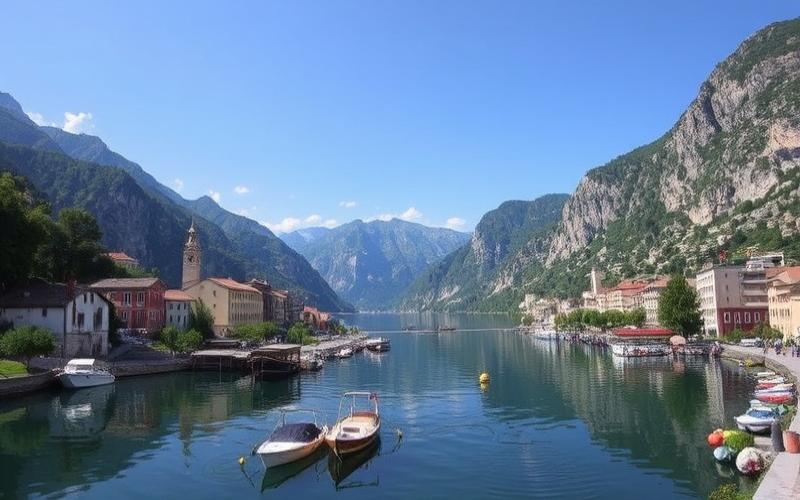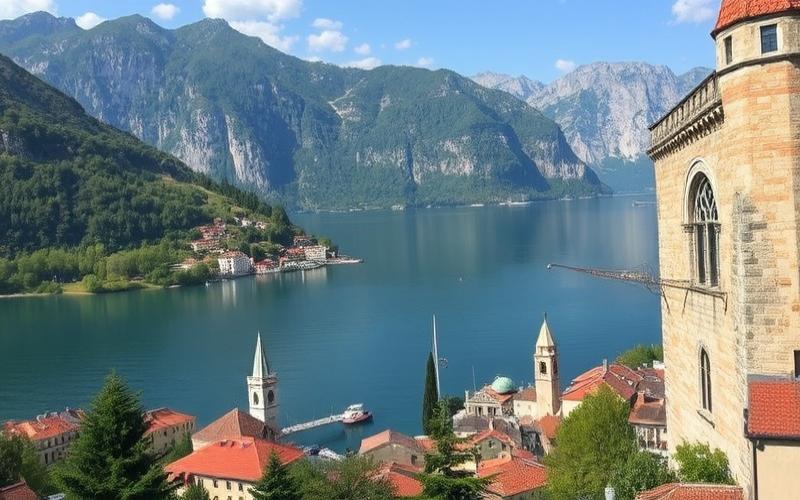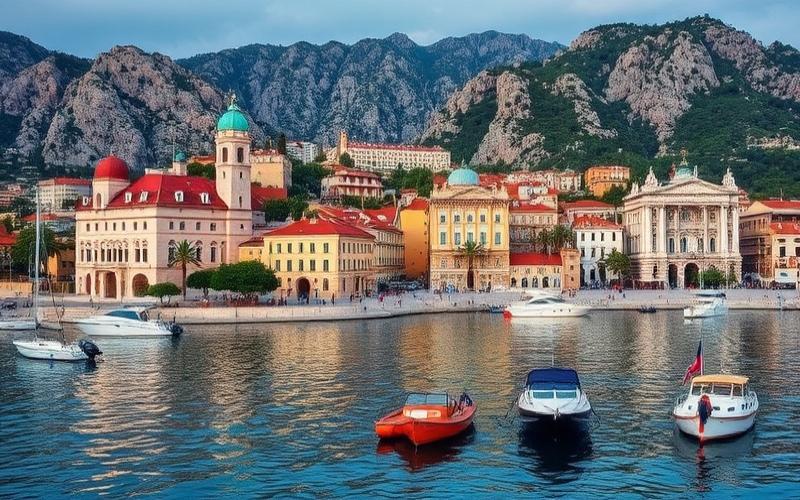
 Published on and written by Cyril Jarnias
Published on and written by Cyril Jarnias
Montenegro, a small Balkan gem nestled between sea and mountains, is attracting an increasing number of foreign real estate investors. And for good reason: this country offers a particularly advantageous tax framework, combined with a booming real estate market and breathtaking landscapes. Let’s explore together why Montenegro has become a top destination for real estate investors seeking tax optimization and attractive returns.
A Local Tax System That Appeals to Investors
Montenegro stands out with particularly lenient taxation for real estate investors. The corporate tax rate is only 9%, one of the lowest in Europe. This attractive tax policy aims to stimulate foreign investment and the country’s economic development.
For individuals investing in real estate, the news is equally encouraging. Rental income is taxed at a flat rate of 9%, significantly lower than what’s found in most European countries. Additionally, property owners can deduct certain expenses related to maintenance and management of their properties, thereby reducing their taxable base.
Another major tax advantage concerns real estate capital gains. In Montenegro, capital gains from the sale of real estate are tax-exempt after a 5-year holding period. This measure encourages long-term investments and offers valuable flexibility to investors.
Good to Know:
Montenegro offers one of Europe’s most advantageous tax regimes for real estate investors, with corporate and rental income tax rates of only 9%, plus capital gains tax exemption after 5 years of ownership.
International Agreements to Avoid Double Taxation
Montenegro has concluded numerous double taxation avoidance agreements with various countries, further enhancing its appeal to international investors. These agreements aim to prevent income generated in Montenegro from being taxed both in this country and in the investor’s country of residence.
Countries that have signed such agreements with Montenegro include France, Germany, Italy, the United Kingdom, and the United Arab Emirates. These tax treaties typically allow investors to benefit from tax credits in their home country for taxes paid in Montenegro, or complete exemption in some cases.
For French investors, for example, the double taxation avoidance agreement signed between France and Montenegro in 2003 stipulates that rental income from properties located in Montenegro is taxable in that country. French investors can then declare this income in France and benefit from a tax credit equivalent to the tax paid in Montenegro, thus avoiding double taxation.
It’s important to note that each tax treaty has its specificities and application procedures may vary by country. Therefore, consulting a tax expert is recommended to optimize your personal situation.
Good to Know:
Montenegro has signed double taxation avoidance agreements with many countries, allowing foreign investors to avoid double taxation on their real estate income. These agreements strengthen the country’s tax attractiveness for international investors.
Property Tax and Residence Tax: Controlled Costs
Unlike many European countries where property taxes can represent a significant burden for owners, Montenegro stands out with relatively moderate local taxes.
Property tax in Montenegro ranges between 0.1% and 1% of the cadastral value of the property, depending on the municipality. This tax is payable annually by the property owner. It’s worth noting that the cadastral value is generally lower than the actual market value of the property, which helps keep this tax at a reasonable level.
Regarding residence tax, Montenegro does not apply a separate residence tax as found in other countries. Charges related to property occupancy are generally included in the property tax, simplifying management for owners and tenants.
For properties located in tourist areas, there is a tourist tax that applies to short-term rentals. This tax ranges between €0.30 and €1 per person per night, depending on the accommodation category and season. Although this tax is typically passed on to tenants, it remains moderate compared to other European tourist destinations.
It’s also important to mention that some municipalities offer property tax reductions for owners who renovate or restore historical buildings, thereby encouraging the preservation of the country’s architectural heritage.
Good to Know:
Local taxes in Montenegro are relatively moderate, with property tax ranging between 0.1% and 1% of the property’s cadastral value. The absence of a separate residence tax and reasonable tourist taxes for short-term rentals help maintain ownership costs at an attractive level for investors.
Montenegro vs Other Destinations: An Eye-Opening Tax Comparison
To better appreciate Montenegro’s tax attractiveness, it’s interesting to compare its tax regime with other popular real estate investment destinations.
France: With a corporate tax rate of 25% and social charges that can reach 17.2% on rental income for non-residents, France appears significantly less advantageous than Montenegro. Additionally, property tax and residence tax can represent substantial costs for owners.
Spain: The corporate tax rate is 25%, and non-residents are subject to a fixed rate of 24% on their rental income. Although more advantageous than France, this regime remains less attractive than Montenegro’s.
Portugal: Despite its advantageous tax regime for non-habitual residents, Portugal taxes rental income at progressive rates reaching up to 48%. The corporate tax rate is 21%, significantly higher than Montenegro’s 9%.
Hungary: With a corporate tax rate of 9%, Hungary comes close to Montenegro in terms of tax attractiveness. However, rental income is taxed at 15%, which remains less advantageous than the 9% rate applied in Montenegro.
Dubai (United Arab Emirates): Although Dubai is renowned for its absence of income tax, real estate investors must pay a 4% property transfer tax upon purchase, plus potentially high annual maintenance fees. Additionally, the region’s geopolitical instability can be a deterrent for some investors.
This comparison highlights Montenegro’s competitive advantage in real estate taxation. With its uniform 9% tax rate on corporations and rental income, combined with moderate local taxes, Montenegro positions itself as one of Europe’s most tax-attractive destinations for real estate investors.
Good to Know:
Montenegro’s tax regime for real estate investment proves particularly competitive compared to other popular destinations like France, Spain, or Portugal. Its uniform 9% tax rate on corporations and rental income is one of the lowest in Europe, offering a significant advantage to investors.
Tax Optimization Strategies for Investors in Montenegro
To fully leverage the tax benefits offered by Montenegro, real estate investors can implement several optimization strategies.
1. Creating a Local Company Establishing a Montenegrin company can be advantageous for investors holding multiple real estate properties. This structure allows benefiting from the 9% corporate tax rate and offers greater flexibility in managing income and expenses. Additionally, it can facilitate obtaining local financing for future investments.
2. Investing in Development Zones The Montenegrin government offers additional tax incentives for investments made in certain development zones of the country. These benefits may include temporary corporate tax exemptions or property tax reductions. Therefore, it’s wise to inquire about these opportunities before choosing your investment location.
3. Optimizing Deductible Expenses Property owners can deduct expenses related to maintenance, renovation, and management of their real estate properties from their rental income. Proper planning and rigorous tracking of these expenses can significantly reduce the taxable base.
4. Capital Gains Planning Given the capital gains tax exemption after 5 years of ownership, it may be strategic to plan property sales around this timeframe. For investors holding multiple properties, judicious portfolio rotation can optimize capital gains taxation.
5. Utilizing Tax Treaties For foreign investors, good knowledge and use of double taxation avoidance treaties can optimize the overall taxation of their investments in Montenegro. Consulting a tax expert is recommended to ensure full benefit from these agreements.
Good to Know:
Real estate investors in Montenegro can optimize their taxation by creating a local company, investing in development zones, optimizing their deductible expenses, wisely planning their capital gains, and effectively using international tax treaties. A well-thought-out strategy can maximize the tax benefits offered by the country.
Future Outlook: Montenegro, a Sustainable Tax Haven?
While Montenegro’s current tax regime is undeniably attractive for real estate investors, it’s legitimate to question its sustainability and future evolution.
Political and Economic Stability Montenegro, a candidate for European Union membership, strives to maintain a stable political and economic environment. This stability is a key factor for the continuity of its attractive tax policy. However, the EU accession process could eventually lead to certain tax adjustments to comply with European standards.
Real Estate Market Development The Montenegrin real estate market is experiencing sustained growth, particularly in the luxury tourism sector. This trend should continue, supporting demand for real estate investments. According to government forecasts, the real estate sector should contribute up to 20% to the country’s GDP by 2030, compared to about 15% currently.
Possible Tax Evolution Although the Montenegrin government has reaffirmed its commitment to maintaining an attractive tax regime for investors, some adjustments may be made in the future. These changes could aim to balance the country’s tax revenue needs with maintaining a favorable environment for foreign investment.
Economic Diversification Montenegro seeks to diversify its economy beyond tourism and real estate. This strategy could influence future tax policies, with potential new incentives for priority sectors.
Regional Competition Other countries in the region, such as Serbia or Croatia, might seek to adjust their own tax regimes to attract investors. This competition could encourage Montenegro to maintain, or even strengthen, its current tax advantages.
Despite these uncertainty factors, experts agree that Montenegro should maintain a generally favorable tax regime for real estate investors in the coming years. The country’s political stability, its commitment to the EU accession process, and its willingness to stimulate foreign investment are all guarantees of continuity for its attractive tax policy.
Good to Know:
Although tax adjustments are possible in the future, particularly within the framework of the EU accession process, Montenegro should maintain a generally favorable tax regime for real estate investors in the coming years. The continued growth of the real estate market and the government’s commitment to attracting foreign investment support this outlook.
In conclusion, Montenegro currently offers one of Europe’s most attractive tax environments for real estate investors. With its uniform 9% tax rate, moderate local taxes, and double taxation avoidance agreements, the country positions itself as a top destination for investors seeking tax optimization. Although future developments are possible, the outlook remains favorable for those wishing to invest in Montenegrin real estate.
Disclaimer: The information provided on this website is for informational purposes only and does not constitute financial, legal, or professional advice. We encourage you to consult qualified experts before making any investment, real estate, or expatriation decisions. Although we strive to maintain up-to-date and accurate information, we do not guarantee the completeness, accuracy, or timeliness of the proposed content. As investment and expatriation involve risks, we disclaim any liability for potential losses or damages arising from the use of this site. Your use of this site confirms your acceptance of these terms and your understanding of the associated risks.








